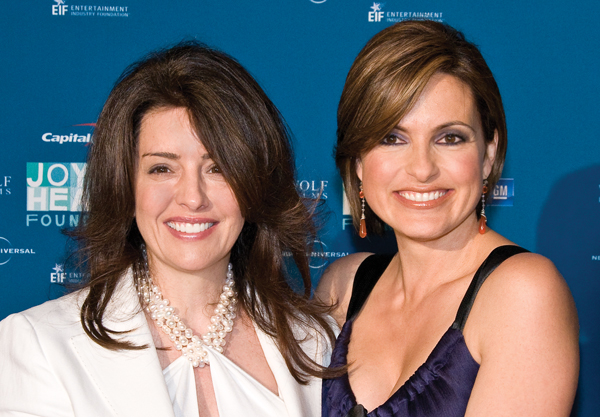You can leave this site quickly.
Learn more about Internet safety.
Hero of the Heart: Cristina Carlino
CC: I just can’t believe this is the best we can do as people in this world. Whether we’re talking about the issues that JHF covers [or] the environment, no matter where you look, we’ve got to do better. So I just say, rather than asking someone else to do better, why don’t I just do better? I’m very motivated by looking at my daughter and at all these kids coming out of her school, and I think, “This is not right. We cannot hand this world over to these kids the way it is. We can’t continue to tolerate things that are just intolerable.” We all have to do our part, and my part [is] a supporting cast member, if you will.
PH: How did your association with Joyful Heart begin?
CC: I met Mariska through a friend who said, “You’ve got to meet her, she wants to meet you. I think she would be a great match for philosophy.” I’ve never had time to watch a lot of TV, so I asked, “Mariska Hargitay? Who is that?” And then I saw her picture, and said, “Wait, that’s that woman I love!” Because I’d seen the show once a long time ago and just really connected with her character the moment I saw her on screen. So I said, “That’s who you’re talking about? Love the character, love the woman. I’m in all the way!” Then I just had to practice saying her name.
PH: What does Joyful Heart’s cause mean to you?
CC: I learned late in my life that one of my dearest friends and her sister were victims of sexual assault and abuse by a parent— a very successful parent—and both of them just had enormous struggles in their adult lives. That is a horrifying story to look back on, knowing that this was happening to one of your friends and her sister, and you had no awareness of it. The other thing that really got me is just the statistic alone. Breast cancer [affects] one out of seven women by the age of 70–75. Then you looked at this statistic, one out of three or four [women will experience sexual or domestic violence]. That means that one out of three times you’re hugging a woman, she’s been through some very, very awful things. But so often, you’re not going to hear about it from them because they’re not going to talk about it. So I wanted to help Joyful Heart open up the dialogue in a safe way.
PH: What do you envision when you picture progress?

CC: Getting the statistics out there, for starters, to let people know this is happening, and to let them know they have so many more friends who have gone through this than they realize. I would also hope it would get women to be much more compassionate with each other, because women sometimes have trouble with that. I’ve also had to speak to my daughter about all of this. I’ve had to teach my daughter things I never imagined I would teach her by seven and eight years old. I didn’t know these things growing up. I couldn’t even fathom having the conversations I’ve already had with my daughter. But we went through it. It was hard, but you have to do it. Whether you have a daughter or a son, you’re going to have to have a conversation with your children earlier than may be comfortable. I think the education piece for parents is an area where Joyful Heart can be really, really helpful.
PH: I know that you had a very powerful, life-changing, mountaintop experience. Can you talk about that?
CC: (She laughs.) Actually, I’ve had a couple. But the greatest epiphany was becoming a parent, realizing that all the things that I thought mattered don’t matter one bit. That’s what The Changing Room is about. My daughter made everything count. Whether it was the environment, or how I wanted to perceive beauty, or how I wanted to perceive assault or rape, everything changed with this child, because she gave me a view into what fragility really looks like when a child is defenseless against the things we’re talking about. ♥




Your Voices